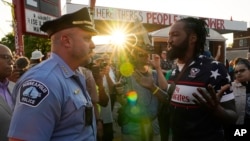In a no-holds-barred report submitted to the United Nations human rights council Thursday, U.N. human rights experts have called for urgent reform of the U.S. criminal justice system to combat what they say is systemic racism and racial discrimination against people of African descent.
The 32-page report found that racism in the United States, a legacy of slavery and the transatlantic slave trade, continues to exist today in the form of racial profiling, police killings and other human rights violations.
“In the United States, we witnessed the overrepresentation of people of African descent in the criminal justice system,” Tracie Keesee, a U.N. independent expert, told the council.
Keesee is one of three members of the International Independent Expert Mechanism to Advance Racial Justice and Equality in the Context of Law Enforcement. The Mechanism was set up by the council in 2021 following the murder of African American George Floyd, who was killed by police officers in Minneapolis, Minnesota, in May 2020.
The Mechanism’s report was based on a 12-day visit to six major U.S. cities in April and May to investigate the root causes of systemic racism. They visited five detention centers, met with officials and civil society groups, and heard testimonies from 133 affected individuals.
“We were alarmed by the figures and circumstances in which people of African descent are killed by police in disproportionate numbers, pointing to a systemic problem,” Keesee said.
The report found that “Every year, more than 1,000 individuals are reportedly killed by law enforcement throughout the country. Available data shows that Black people are three times more likely to be killed by police than white people,” and 4.5 times more likely to be incarcerated.
Keesee expressed concern about the increased use of police response “to mental health crises, education, homelessness and traffic controls,” which disproportionately affect people of African descent.
The investigators found that African American women prisoners represent 34% of all incarcerated women and were “more likely to be restrained and shackled than their white counterparts.”
“The Mechanism heard, firsthand, unbearable direct testimonies of pregnant women shackled during labor, who due to the chaining lost their babies,” the report said.
They expressed shock at the large number of incarcerated children, many of whom are held in adult prisons, noting that “only in 2019, there were more than 240,000 occurrences of children detained, committed or both in the juvenile justice system.”
The report said that “Black children were more than four times as likely to be detained or committed in juvenile facilities as their white peers” and that many of these children were sentenced to life imprisonment.
Keesee called on the U.S. government “to address the legacies of enslavement, which still lead to discriminatory practices, and to adopt alternative methods to policing.”
Michele Taylor, U.S. ambassador to the U.N. human rights council, acknowledged that “systemic racism against people of African descent in the law enforcement and the criminal justice systems has existed for centuries and continues to exist in the United States and abroad.”
She said Washington remained committed to advancing racial justice and equity and to preventing and countering systemic racism wherever it occurs, noting the Biden administration was undertaking several initiatives to address the impact of systemic racism “through safe, effective and accountable community policing as well as improvements to the criminal justice system.”
Nada Al-Nashif, U.N. deputy high commissioner for human rights, who led the debate at the council, said that a report by High Commissioner Volker Türk indicated that some positive steps have been taken to address systemic racism since the killing of George Floyd.
For example, she said, “All four former Minneapolis police officers involved in the murder of George Floyd have been sentenced to prison terms by state and federal courts.”
Then again, she noted that British officials reinvestigated the case of Kevin Clarke, a 35-year-old Black man who experienced a mental health crisis and died following restraint by Metropolitan Police officers in London in 2018.
Based on their findings, she said, “the Independent Office for Police Conduct announced that two police officers will face proceedings for gross misconduct and one police officer for gross incompetence.”
Unfortunately, such outcomes are rare, she said.
“It remains clear that in the vast majority of deaths of people of African descent after an interaction with law enforcement, progress toward accountability and redress is severely lacking,” she said.
“In their struggle for justice, families continue to endure protracted and emotionally and financially draining processes — without adequate state support,” she said.




